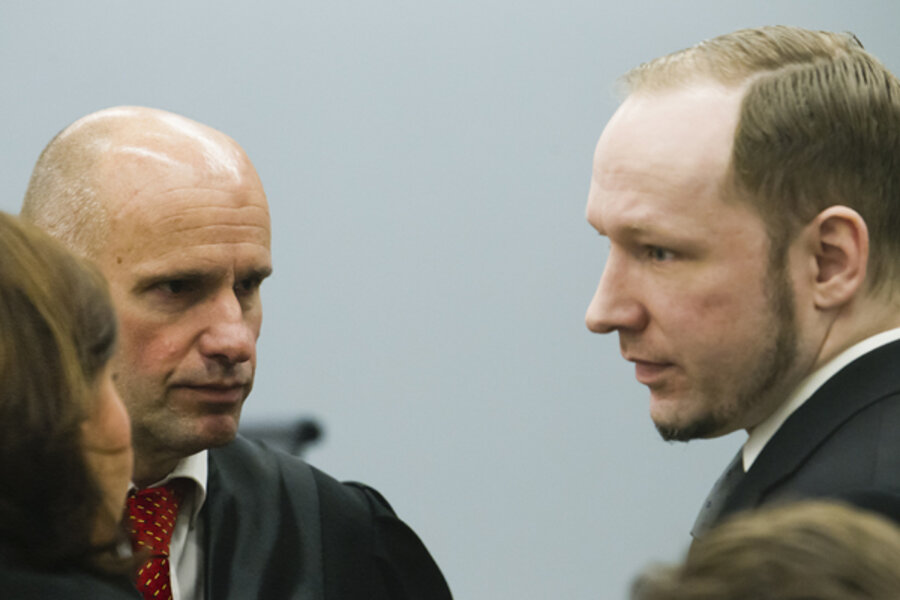Breivik apologizes for killing Oslo bystanders, but not teens at summer camp
Loading...
| Oslo
Accused murderer Anders Behring Breivik apologized in a Norwegian court today for killing “non-legitimate” targets when he bombed a government building in Oslo as part of last summer's terror attacks that killed 77.
During his fifth day of testimony in this highly emotional trial, Mr. Breivik detailed his “deepest apologies and regrets” to the family of Kai Hauge, a bystander who died from the Oslo bombing, as well as others innocent civilians with no connection to the Labor party that were killed or hurt in the attack.
Breivik placed a car bomb outside the prime minister’s main offices that claimed eight lives, seriously injured nine, and injured at least 200 more people, according to the indictment.
Jon Hestnes, representative for victims and their families in the government attack, told Norwegian television station NRK that he was surprised by Breivik’s statement, but doubted its sincerity.
“I think it was pathetic,” said Mr. Hestnes. “What he said doesn’t help anyone. There was no expression in his body language that showed he meant what he said.”
Breivik bombed the government buildings as part of an attack on the Labor Party, which he blames for undermining Norwegian society with its policies that promote multiculturalism, such as lenient immigration policies. Later that day, he shot and killed 69 at the party's youth summer camp on Utøya island, which he called Labor’s “indoctrination camp.”
When asked by Svein Holden, Oslo public prosecutor, if he had similar regrets about killing the young people at Utøya, he replied with no hesitation, “No, I do not." "Utøya was the best political target in Norway at the time,” he said.
Mr. Holden pressed Breivik on whether it weighed on his conscience that he had most likely traumatized a 10-year-old boy whose father, an unarmed security guard, was the first victim on the island. Breivik said he intentionally spared the boy because of his young age.
He replied that the attack was part of “a little barbarism, to avoid a larger barbarism," referring to his belief that Muslim immigration poses a threat to Norway and the rest of Europe.
Breivik implied that, like the families of his shooting victims, he had also been cut off from those he loved.
“The only difference is that for me it was a choice," he told Inga Bejer Engh, the other prosecutor in this case. "They never got a choice, I took it away from them.”
The numerous questions to Breivik regarding his emotions – and lack thereof – are expected to be key in determining if he is legally sane. Whether he is found sane by the judges will determine if he heads to prison or a mental asylum if he is found guilty.
Breivik has been able to remain composed during most of the trial, even while recounting in detail how he shot the youth on Utøya.
Prosecutors have recommended that Breivik be remanded to compulsory mental care for his otherwise punishable acts, based on the first forensic psychiatric report in November that found Breivik paranoid schizophrenic. A second forensic report later deemed Breivik not psychotic.
Breivik has repeatedly over the course of the trial thwarted attempts by the prosecution to portray him as insane. He has said he wants to be considered sane so that his ideology will stand stronger.
“If I had been a bearded jihadist, they never would have appointed [psychiatrist] experts,” Breivik told Geir Lippestad, his defense attorney, during cross-examination today. “But because I am a militant nationalist, so then I am exposed to blatant racism whereby they try to delegitimize all I stand for.”
Judge Arne Lyng read a statement today by the Norwegian Board of Forensic Medicine which asked the psychiatrists behind the second report to issue a supplementary statement because they had not taken enough consideration for the possibility of a "false negative conclusion" in the event Breivik had given strategic replies. The board also criticized the lack of information on Breivik's childhood.Terje Tørrisen and Agnar Aspaas, the two psychiatrists behind the report, promised to provide the additional report by the end of the week.
Breivik faces a maximum sentence of 21 years if he is found sane and criminally responsible for his acts. He has pleaded not guilty and claims self-defense for his “preventive attack” against the ethnic cleansing of indigenous Norwegians by Muslims. The judges are expected to take their decision on his sanity at the end of the 10-week trial, possibly sometime in July.







